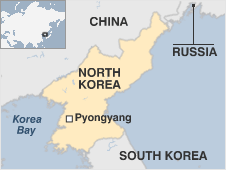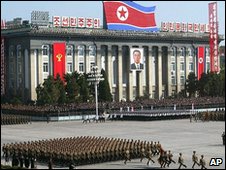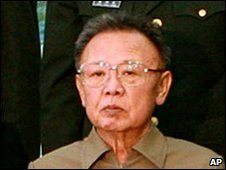 |
For decades North Korea has been one of the world's most secretive societies. It is one of the few countries still under communist rule.
North Korea's nuclear ambitions have exacerbated its rigidly maintained isolation from the rest of the world.
The country emerged in 1948 amid the chaos following the end of World War II. Its history is dominated by its Great Leader Kim Il-sung who shaped political affairs for almost half a century.
Overview
After the Korean War Kim Il-sung introduced the personal philosophy of Juche or self-reliance which became a guiding light for North Korea's development. Kim Il-sung's son Kim Jong-il is now head of state but the post of president has been assigned "eternally" to his late father.
Decades of this rigid state-controlled system have led to stagnation and a leadership dependent on the cult of personality.
AT-A-GLANCE
 Politics: Supreme leader Kim Jong-il heads a secretive communist regime which tolerates no dissent
Economy: North Korea's command economy is dilapidated hit by natural disasters poor planning and a failure to modernise
International: The armstice of 1953 ended armed conflict on the Korean peninsular but the two Koreas are technically still at war; tensions have been exacerbated in recent decades by North Korea's nuclear ambitions
|
Aid agencies have estimated that up to two million people have died since the mid-1990s because of acute food shortages caused by natural disasters and economic mismanagement. The country relies on foreign aid to feed millions of its people.
The totalitarian state also stands accused of systematic human rights abuses. Reports of torture public executions slave labour and forced abortions and infanticides in prison camps have emerged. A US-based rights group has estimated that there are up to 200000 political prisoners in North Korea.
Pyongyang has accused successive South Korean governments of being US "puppets" but South Korean President Kim Dae-jung's visit in 2000 signalled a thaw in relations. Seoul's "sunshine policy" towards the north aimed to encourage change through dialogue and aid.
But this tentative reaching-out to the world was dealt a blow in 2002 by Pyongyang's decision to reactivate a nuclear reactor and to expel international inspectors.
In October 2006 North Korea said it had successfully tested a nuclear weapon spreading alarm throughout the region.
Since then intensive diplomatic efforts have aimed to rein in North Korea's nuclear ambitions. After years of on-and-off talks a deal was thrashed out in February 2007 under which Pyongyang agreed to shut down its main nuclear reactor in return for aid and diplomatic concessions.
But negotiations stalled as North Korea accused its negotiating partners - the US South Korea Japan China and Russia - of failing to meet agreed obligations.
Tensions between North Korea and the rest of the world increased steadily again from late 2008 onwards and in April 2009 North Korea walked out of international talks aimed at ending its nuclear activities.
The following month the country carried out its second ever underground nuclear test and announced that it no longer considered itself bound by the terms of the 1953 truce that ended the war between the two Koreas.
North Korea maintains one of the world's largest standing armies and militarism pervades everyday life. But standards of training discipline and equipment in the force are said to be low.
In 2002 US President George W Bush named the country as part of an "axis of evil".
Facts
- Full name: The Democratic People's Republic of Korea
- Population: 23.9 million (UN 2009)
- Capital: Pyongyang
- Area: 122762 sq km (47399 sq miles)
- Major language: Korean
- Major religions: Mainly atheist or non-religious traditional beliefs
- Life expectancy: 65 years (men) 69 years (women) (UN)
- Monetary unit: 1 won = 100 chon
- Main exports: Minerals and metals cement agricultural products
- GNI per capita: n/a
- Internet domain: .kp
- International dialling code: +850
Leaders
Eternal president: Kim Il-sung (deceased)
Chairman National Defence Commission: Kim Jong-il
Beyond the elaborate personality cult through which he rules little is known about Kim Jong-il's character.

"Dear Leader" Kim Jong-il
|
He is rarely photographed and is almost never heard in radio and TV broadcasts.
After the death of Kim Il-sung in 1994 Kim Jong-il did not immediately assume his father's titles; there were reports that Kim Il-sung's first choice as successor was the younger brother Kim Yong-ju. Kim Jong-il eventually became head of the Korean Workers' Party in 1997.
He is credited with writing six operas in two years and with personally designing the huge Juche tower in Pyongyang.
In recent years he has met several world leaders including the South Korean president and the Japanese prime minister. He has attended summits in Moscow and Beijing.
Mr Kim is sometimes caricatured as a reclusive playboy with bouffant hair platform shoes and a taste for cognac.
There has been speculation about his health. Mr Kim is said to have gastric problems arising from his love of spicy food. Other reports suggest that he has liver problems.
Rumours of poor health were given fresh impetus when Mr Kim failed to appear at a parade to mark North Korea's 60th anniversary in October 2008.
North Korea watchers believe that one of Mr Kim's three sons will become the dictator's anointed heir. In 2009 South Korean media reported that he had designated his third son Kim Jong-un as his successor.
Kim Jong-il was born in Siberia in 1941 during his father's period of exile in the former Soviet Union.
But official North Korean accounts say he was born in a log cabin at his father's guerrilla base on the country's highest mountain - an event marked by a double rainbow and a new star in the sky.
Media
Radio and TV sets in North Korea are pre-tuned to government stations that pump out a steady stream of propaganda. The state has been dubbed the world's worst violator of press freedom by the media rights body Reporters Without Frontiers.
Reporters Without Borders 2008
|
Press outlets and broadcasters - all of them under direct state control - serve up a menu of flattering reports about Kim Jong-il and his daily agenda. North Korea's economic hardships or famines are not reported.
However after the historic Korean summit in Pyongyang in 2000 media outlets toned down their fierce denunciations of the Seoul government.
Ordinary North Koreans caught listening to foreign broadcasts risk harsh punishments such as forced labour. The authorities attempt to jam foreign-based and dissident radio stations.
North Korea has a minimal presence on the internet. The web pages of North Korea's official news agency KCNA are hosted by the agency's bureau in Japan.
According to Reporters Without Borders exiled North Korean journalists are active on blog sites hosted in Japan and South Korea.
The press
- Rodong Sinmun (Labour Daily) - organ of Korean Workers' Party
- Joson Inmingun (Korean People's Army Daily)
- Minju Choson (Democratic Korea) - government organ
- Rodongja Sinmum (Workers' Newspaper) - organ of trade union federation
Television and radio
- Korean Central Broadcasting Station - radio station of Korean Workers' Party
- Korean Central TV - TV station of Korean Workers' Party
- Mansudae TV - cultural station
- Voice of Korea - state-run external service via shortwave
News agency
-
Korean Central News Agency (KCNA)
AFRICA | ASIA-PACIFIC | AMERICAS | EUROPE | MIDDLEEAST | SOUTHASIA
Mauritania Mauritius Morocco Mozambique Namibia Niger Nigeria Republic-of-congo Rwanda Sao-tome-and-principe Senegal Seychelles Sierra-leone Somalia South-africa Sudan Swaziland Tanzania The-gambia Togo Tunisia Uganda zambia Zimbabwe Australia Brunei Burma Cambodia China East-timor Fiji Indonesia Japan Kazakhstan Kiribati Kyrgyzstan Laos Malaysia Marshall-islands Micronesia Mongolia Nauru New-zealand North-korea Palau Papua-new-guinea Samoa Singapore Solomon-islands South-korea Taiwan Tajikistan Thailand The-philippines Tonga Turkmenistan Tuvalu Uzbekistan Vanuatu Vietnam Antigua-and-barbuda Argentina Bahamas Barbados Belize Bolivia Brazil Canada Chile Colombia Costa-rica Cuba Dominica Dominican-republic Ecuador El-salvador Grenada Guatemala GuyanaHaiti Honduras Jamaica Mexico Nicaragua Panama Paraguay Peru St-kitts-and-nevis St-lucia St-vincent-and-the-grenadines Suriname Trinidad-and-tobago United-states-of-america Uruguay Venezuela Albania Andorra Armenia Austria Azerbaijan Belarus Belgium Bosnia-hercegovina Bulgaria Croatia Cyprus Czech-republic Denmark Estonia Finland France Georgia Germany Greece Hungary Iceland Ireland Italy Latvia Liechtenstein Lithuania Luxembourg Macedonia Malta Moldova Monaco Montenegro Norway Poland Portugal Russia San-marino Serbia Slovakia Slovenia Spain Sweden Switzerland The-netherlands Turkey Ukraine United-kingdom Vatican Algeria Egypt Iran Iraq Israel-and-palestinian-territories Jordan Kuwait Lebanon Libya Mauritania Oman Saudi-arabia Sudan Syria Tunisia United-arab-emirates Yemen Afghanistan Bangladesh Bhutan India Nepal Pakistan Sri-Lanka The-Maldives

